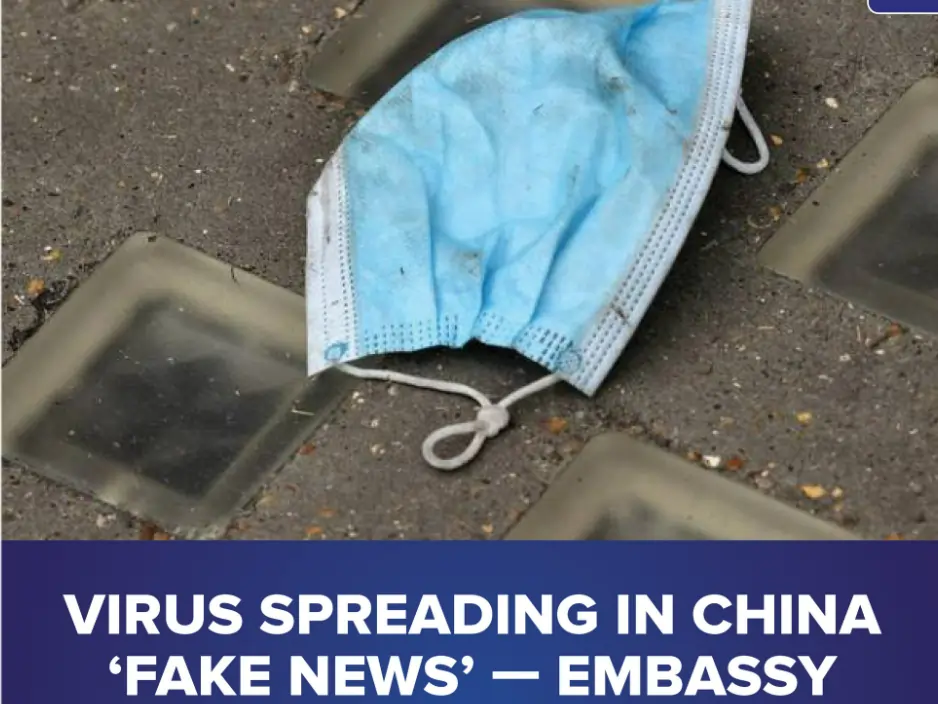
Table of Contents
The Chinese Embassy in the Philippines on Friday dismissed as “fake news” social media posts claiming that a new disease outbreak in China is causing “international health concern.” The embassy reassured the public that these rumors are baseless and have no credible evidence to support them.
Earlier this week, various social media posts alleged a surge in respiratory illnesses in China, including human metapneumovirus (HMPV), Influenza A, Mycoplasma pneumoniae, and Covid-19. The misinformation rapidly spread, sparking unnecessary panic and concern among the public.

Addressing the Claims
The Chinese Embassy was quick to refute the false information, emphasizing the importance of relying on credible sources. In their official statement, they reiterated:
“The information being circulated about a new disease outbreak is unfounded and irresponsible. We urge the public to rely on verified sources and refrain from spreading baseless claims.”
The embassy also highlighted that China has been proactive in monitoring public health and has a robust system in place for early detection and management of potential health concerns.
The Alleged Diseases Explained
Social media posts specifically mentioned respiratory illnesses such as HMPV, Influenza A, and Mycoplasma pneumoniae, along with Covid-19. Here’s a detailed breakdown of these diseases:
- Human Metapneumovirus (HMPV): A common virus that causes respiratory infections, particularly in young children and the elderly. It often presents symptoms similar to the common cold but can lead to more severe conditions in vulnerable individuals. Cases typically spike during colder months, and there are no specific antiviral treatments available, though supportive care is effective.
- Influenza A: A subtype of the flu virus that can cause seasonal epidemics. Vaccines are available annually to prevent widespread outbreaks. Symptoms include fever, cough, muscle aches, and fatigue. Early medical intervention and preventive vaccination remain the best defenses.
- Mycoplasma Pneumoniae: A bacterium known for causing respiratory illnesses often referred to as “walking pneumonia.” While generally mild, it can escalate in severity if untreated. Antibiotics are effective, and cases are not uncommon during seasonal transitions.
- Covid-19: The global pandemic caused by the SARS-CoV-2 virus. Although global cases have declined significantly, countries continue to monitor emerging variants to maintain health security.
The embassy stressed that these illnesses are either seasonal or manageable within the scope of normal healthcare systems and do not indicate a novel or large-scale outbreak.

China’s Proactive Measures
China has consistently demonstrated its commitment to global health by maintaining stringent health protocols and close cooperation with international organizations such as the World Health Organization (WHO). Regular updates are shared transparently, showcasing:
- Enhanced Surveillance: Rigorous monitoring of health trends to quickly identify anomalies.
- Vaccination Programs: Comprehensive campaigns to inoculate vulnerable populations against preventable diseases.
- Research and Development: Ongoing efforts to improve diagnostic tools, vaccines, and treatment protocols.
The embassy reiterated that any major health concerns would be officially announced and managed in coordination with global health partners.
The Role of Media and Public Responsibility
The rapid dissemination of rumors about a new disease outbreak highlights the growing challenge of misinformation in the digital age. Health experts and the Chinese Embassy alike have urged media platforms and the public to practice responsible communication:
- Fact-Checking Before Sharing: Ensure that information comes from verified sources.
- Consult Credible Authorities: Trusted health organizations, such as the WHO, serve as reliable references for public health updates.
- Avoid Sensationalism: Overstating or dramatizing unverified claims can cause unnecessary fear and hinder effective communication during actual emergencies.

Public Reactions to Misinformation
The spread of false claims on social media has led to mixed reactions. While some individuals quickly dismissed the rumors, others expressed anxiety and confusion. Public health officials have stepped up efforts to counter misinformation by issuing clear and concise advisories to reassure the population.
Conclusion: Trust Verified Sources
The Chinese Embassy’s dismissal of the “fake news” surrounding a new disease outbreak serves as a reminder of the importance of credible information. Public health relies heavily on trust and accurate communication, and misinformation can jeopardize both. As the digital age continues to amplify the speed of information dissemination, the responsibility to ensure accuracy has never been more critical.
Citizens and media outlets are encouraged to verify all claims through official sources and prioritize factual accuracy to maintain public trust and avoid unnecessary panic.
Disclaimer
This article is based on statements issued by the Chinese Embassy in the Philippines and reputable health sources. Readers are advised to rely on verified health organizations, such as the World Health Organization (WHO) or their local health departments, for up-to-date and accurate information on public health matters.
FAQs
1. What prompted the Chinese Embassy’s statement? The Chinese Embassy issued the statement to refute social media rumors about a new disease outbreak in China, which they called “fake news.”
2. What illnesses were mentioned in the rumors? The rumors mentioned Human Metapneumovirus (HMPV), Influenza A, Mycoplasma pneumoniae, and Covid-19 as part of a supposed surge in respiratory illnesses in China.
3. How can I ensure I get accurate health information? Always refer to credible sources like the World Health Organization (WHO), local health authorities, and official statements from governments or international health organizations.
TechWirings neither supports nor endorses the views or actions represented in this content.










